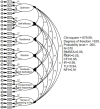Introducing a new concept: Psychological capital of older people and its positive effect on mental health
- PMID: 37020912
- PMCID: PMC10067571
- DOI: 10.3389/fpsyg.2023.1083077
Introducing a new concept: Psychological capital of older people and its positive effect on mental health
Abstract
Objective: This study aimed to explore the structure of psychological capital (PsyCap) and its positive effects on mental health among older people.
Methods: Study 1 used grounded theory to analyze the semi-structured interviewing data of 17 Chinese older people (60-96 years old) to develop a primary PsyCap questionnaire for older people. Study 2, respectively, applied exploratory factor analysis (EFA) with 198 Chinese older people (M = 69.2; SD = 6.685) and confirmatory factor analysis (CFA) with 370 Chinese older people (M = 73.84; SD = 9.416) to test a seven-factor structure for PsyCap. Study 3 used 328 participants (M = 79.73; SD = 9.073) to examine the correlation between PsyCap and mental health.
Results: Study 1 identified that PsyCap of older people contains 'resilience,' 'self-efficacy,' 'optimism,' 'ease and content,' 'gratitude and dedication, 'wisdom,' and 'meaning in life' and generated a primary seven-factor questionnaire. Study 2 proved the overall and internal structure reliability of PsyCap were good (Cronbach's alphas ranged 0.809 ~ 0.935), and the seven-factor measurement model fitted the data well (χ 2/df = 2.07, RMSEA = 0.05, RMR = 0.05, CFI = 0.95, IFI = 0.95, TLI = 0.94, NFI = 0.91). The PsyCap scale was also proved to an excellent convergent validity, discriminant validity, calibration validity, and measurement invariance across different groups. Study 3 found that PsyCap and its seven factors significantly correlated with depression (r = -0.419 ~ -0.163, p < 0.01) after controlling the demographic variables.
Conclusion: These findings provide a reliable and valid assessment for quantitative empirical research of PsyCap among older people and show significant impacts on mental health among older people, which offers new insight into improving mental health from the perspective of positive psychology.
Keywords: mental health; older people; psychological capital; reliability; validity.
Copyright © 2023 Xin and Li.
Conflict of interest statement
The authors declare that the research was conducted in the absence of any commercial or financial relationships that could be construed as a potential conflict of interest.
Figures
Similar articles
-
Development and psychometric testing of the psychological capital questionnaire for nurses.BMC Nurs. 2024 Dec 23;23(1):946. doi: 10.1186/s12912-024-02633-1. BMC Nurs. 2024. PMID: 39716192 Free PMC article.
-
Effective resources for improving mental health among Chinese underground coal miners: perceived organizational support and psychological capital.J Occup Health. 2015;57(1):58-68. doi: 10.1539/joh.14-0082-OA. Epub 2014 Nov 19. J Occup Health. 2015. PMID: 25410268
-
Mediating effect of coping styles on the association between psychological capital and psychological distress among Chinese nurses: a cross-sectional study.J Psychiatr Ment Health Nurs. 2017 Mar;24(2-3):114-122. doi: 10.1111/jpm.12350. Epub 2017 Feb 24. J Psychiatr Ment Health Nurs. 2017. PMID: 28233374
-
A Systematic Scoping Review of Psychological Capital Related to Mental Health in Youth.J Sch Nurs. 2023 Feb;39(1):72-86. doi: 10.1177/10598405211060415. Epub 2021 Dec 13. J Sch Nurs. 2023. PMID: 34898323
-
Positive resources for psychiatry in the fourth industrial revolution: building patient and family focused psychological capital (PsyCap).Int Rev Psychiatry. 2020 Nov-Dec;32(7-8):542-554. doi: 10.1080/09540261.2020.1796600. Epub 2020 Dec 7. Int Rev Psychiatry. 2020. PMID: 33284046 Review.
Cited by
-
Psychological Capital: A Primary Prerequisite for Health Promotion of Family Caregivers of Older Adults.Int J Community Based Nurs Midwifery. 2024 Apr 1;12(2):137-138. doi: 10.30476/IJCBNM.2024.101155.2402. eCollection 2024 Apr. Int J Community Based Nurs Midwifery. 2024. PMID: 38650957 Free PMC article. No abstract available.
-
The Role of Square Dancing in Psychological Capital: Evidence from a Large Cross-Sequential Study.Healthcare (Basel). 2025 Aug 5;13(15):1913. doi: 10.3390/healthcare13151913. Healthcare (Basel). 2025. PMID: 40805943 Free PMC article.
References
-
- Ashraf F., Khan M. A. (2017). Broadening the positive psychological capital construct: an Asian cultural perspective. J. Independent Stud. Res. Manage. Soc. Sci. Econ. 15, 91–105. doi: 10.31384/jisrmsse/2017.15.2.7 - DOI
-
- Avey J. B., Reichard R. J., Luthans F., Mhatre K. H. (2011). Meta-analysis of the impact of positive psychological capital on employee attitudes, behaviors, and performance. Hum. Resour. Dev. Q. 22, 127–152. doi: 10.1002/hrdq.20070 - DOI
-
- Azimi T. (2014). The role of psychological capitals in predicting mental health and well-being of female employees in the education of dehdasht. Indian J. Fundam. Appl. Life Sci. S4, 1297–1304.
LinkOut - more resources
Full Text Sources
Miscellaneous


